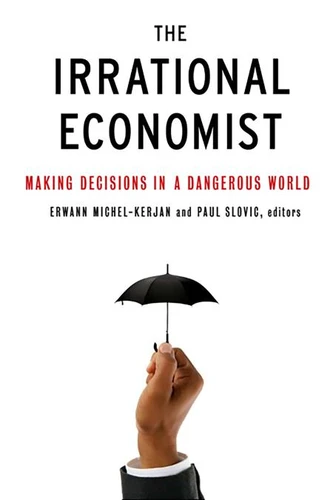The Irrational Economist. Making Decisions in a Dangerous World
Par : ,Formats :
Disponible dans votre compte client Decitre ou Furet du Nord dès validation de votre commande. Le format ePub protégé est :
- Compatible avec une lecture sur My Vivlio (smartphone, tablette, ordinateur)
- Compatible avec une lecture sur liseuses Vivlio
- Pour les liseuses autres que Vivlio, vous devez utiliser le logiciel Adobe Digital Edition. Non compatible avec la lecture sur les liseuses Kindle, Remarkable et Sony
- Non compatible avec un achat hors France métropolitaine
 , qui est-ce ?
, qui est-ce ?Notre partenaire de plateforme de lecture numérique où vous retrouverez l'ensemble de vos ebooks gratuitement
Pour en savoir plus sur nos ebooks, consultez notre aide en ligne ici
- Nombre de pages336
- FormatePub
- ISBN978-0-7867-4626-2
- EAN9780786746262
- Date de parution04/01/2010
- Protection num.Adobe DRM
- Infos supplémentairesepub
- ÉditeurPublicAffairs
Résumé
Of the twenty most costly catastrophes since 1970, more than half have occurred since 2001. Is this an omen of what the 21st century will be? How might we behave in this new, uncertain and more dangerous environment? Will our actions be rational or irrational? A select group of scholars, innovators, and Nobel Laureates was asked to address challenges to rational decision making both in our day-to-day life and in the face of catastrophic threats such as climate changes, natural disasters, technological hazards, and human malevolence.
At the crossroads of decision sciences, behavioral and neuro-economics, psychology, management, insurance, and finance, their contributions aim to introduce readers to the latest thinking and discoveries. The Irrational Economist challenges the conventional wisdom about how to make the right decisions in the new era we have entered. It reveals a profound revolution in thinking as understood by some of the greatest minds in our day, and underscores the growing role and impact of economists and other social scientists as they guide our most important personal and societal decisions.
At the crossroads of decision sciences, behavioral and neuro-economics, psychology, management, insurance, and finance, their contributions aim to introduce readers to the latest thinking and discoveries. The Irrational Economist challenges the conventional wisdom about how to make the right decisions in the new era we have entered. It reveals a profound revolution in thinking as understood by some of the greatest minds in our day, and underscores the growing role and impact of economists and other social scientists as they guide our most important personal and societal decisions.
Of the twenty most costly catastrophes since 1970, more than half have occurred since 2001. Is this an omen of what the 21st century will be? How might we behave in this new, uncertain and more dangerous environment? Will our actions be rational or irrational? A select group of scholars, innovators, and Nobel Laureates was asked to address challenges to rational decision making both in our day-to-day life and in the face of catastrophic threats such as climate changes, natural disasters, technological hazards, and human malevolence.
At the crossroads of decision sciences, behavioral and neuro-economics, psychology, management, insurance, and finance, their contributions aim to introduce readers to the latest thinking and discoveries. The Irrational Economist challenges the conventional wisdom about how to make the right decisions in the new era we have entered. It reveals a profound revolution in thinking as understood by some of the greatest minds in our day, and underscores the growing role and impact of economists and other social scientists as they guide our most important personal and societal decisions.
At the crossroads of decision sciences, behavioral and neuro-economics, psychology, management, insurance, and finance, their contributions aim to introduce readers to the latest thinking and discoveries. The Irrational Economist challenges the conventional wisdom about how to make the right decisions in the new era we have entered. It reveals a profound revolution in thinking as understood by some of the greatest minds in our day, and underscores the growing role and impact of economists and other social scientists as they guide our most important personal and societal decisions.





